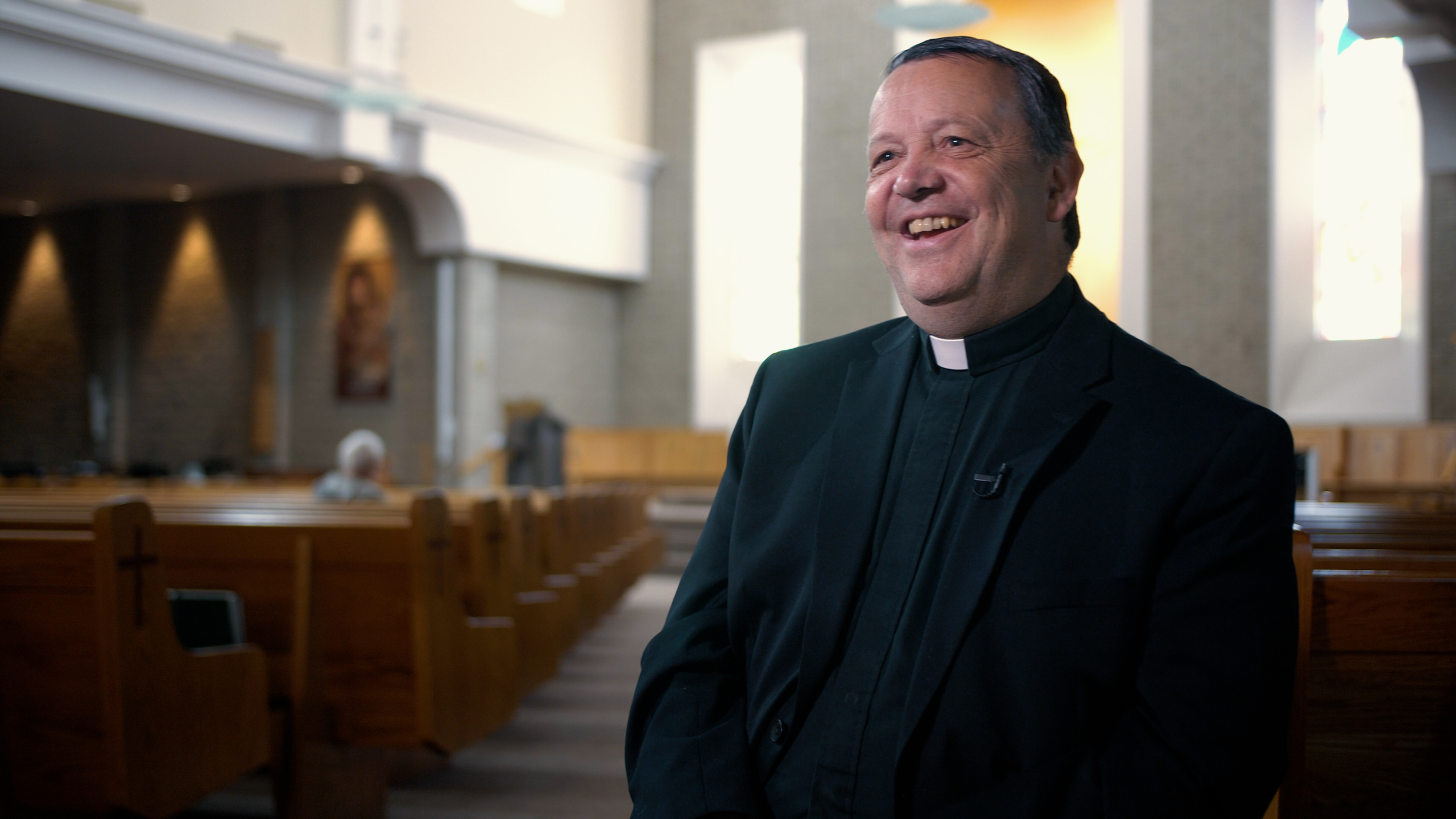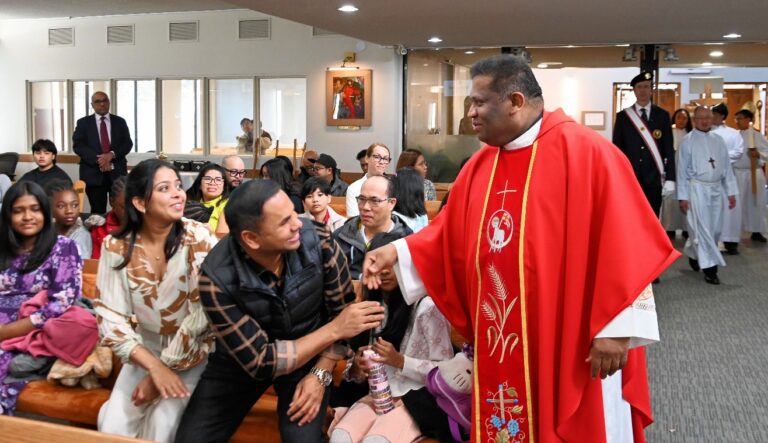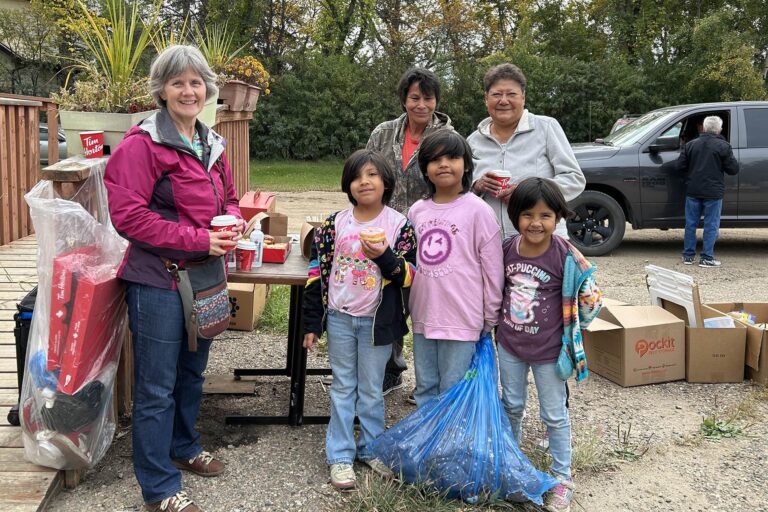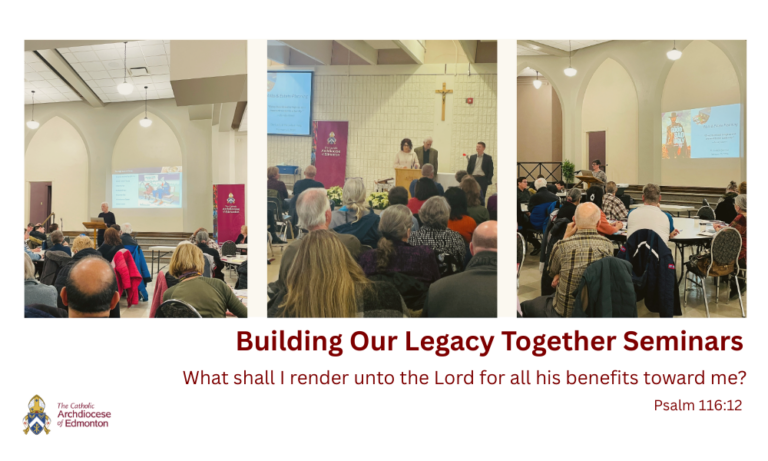Father Paul Moret is a priest for the Archdiocese of Edmonton. He currently serves as the pastor for Holy Trinity Catholic Church in Spruce Grove. He grew up in Edmonton and his childhood parish was St. Joseph’s Basilica. Father Moret entered seminary in 1983 at the age of 22 and he was ordained to the priesthood in 1988. He was also the vocations director for the Archdiocese of Edmonton from 2003 to 2007. Watch the video version of his story here.
When did you first think of the priesthood?
I first started thinking seriously about the priesthood when I was in junior high, around Grade 8. For me, from a young age, I would go to Mass with my dad on a daily basis, from about nine years old, or so. As a child, I went to Mass every day. I was exposed to the priesthood, in the Mass, and it certainly entered my mind, even as a youngster.
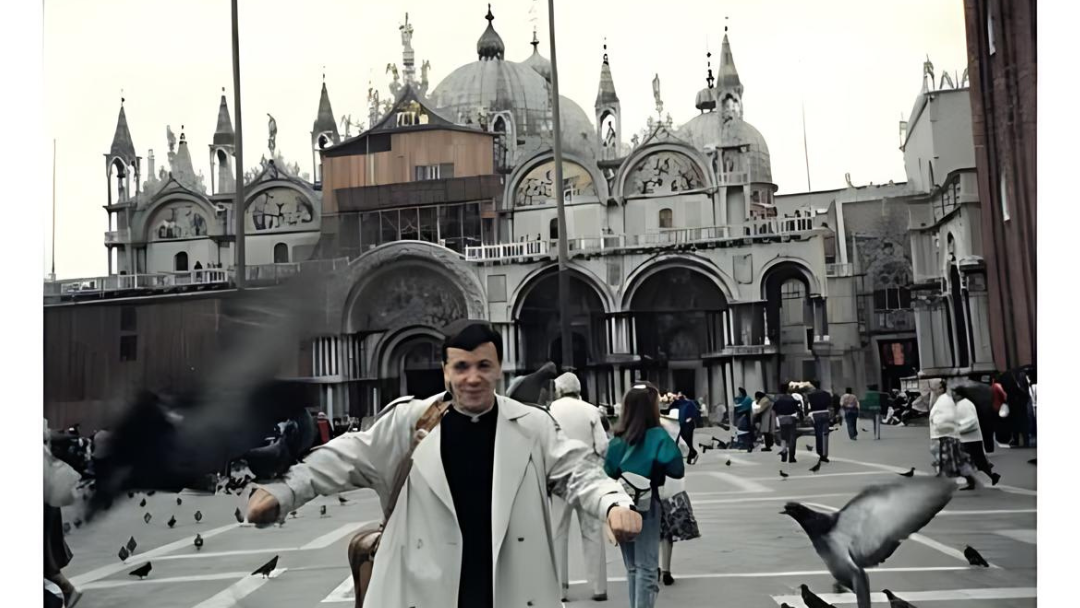
As a kid, do you remember finding the Mass appealing?
Nobody made me go; I chose to go, but it was more in terms of pleasing my parents than any kind of devotional expression to God. But you know, it was something to be exposed that much to the Mass. It is significant that the priesthood entered my path in that way.
What triggered that process of thinking about the priesthood in a more focused way?
Well, I was presented with a book. I even forget exactly how or who it was that gave me this particular book. And it was upon reading that book that I came to a stronger realization that all of this is real, that God is real, and that I\’m going to have to make an account of my life and other things like that.
So that\’s really when I started to think seriously about this and started to take a lot more of my faith into my own hands, in the sense of not only going to Mass with my Dad in the morning but sometimes going on my own, walking the distance to the cathedral to go to Mass on weekdays.
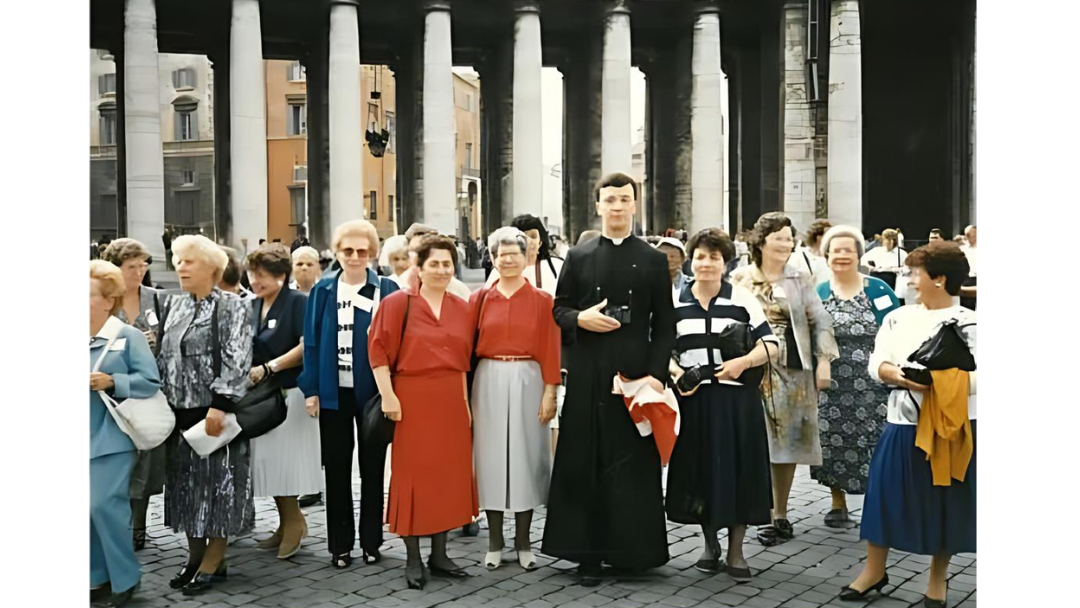
How did you end up at the seminary?
Despite being from Edmonton, I went to St. Peter\’s Seminary in London, Ont. Now, in retrospect, I didn\’t handle things the way I probably should have. I kept a lot of my thoughts about vocation just to myself. I didn\’t share with others, not because I was in any way embarrassed or anything like that. My concern was that I would be pushed in that direction of priesthood. And I wanted to figure everything out myself.
I should have mentioned it to somebody. I should have had spiritual direction and things like that, which I didn\’t do.
So when I went to university, I went to the University of Alberta, and I went into a program for Honors Mathematics. I knew from speaking to other priests that they didn\’t necessarily have to get a degree in Philosophy or other things like that; you could do something else and then get the philosophy requirements later.
But I didn\’t do so well, in my first year of university. So I took a year off, and then went back and took a series of courses in Philosophy and History. After graduating from the U of A, I went to St. Peter\’s Seminary.
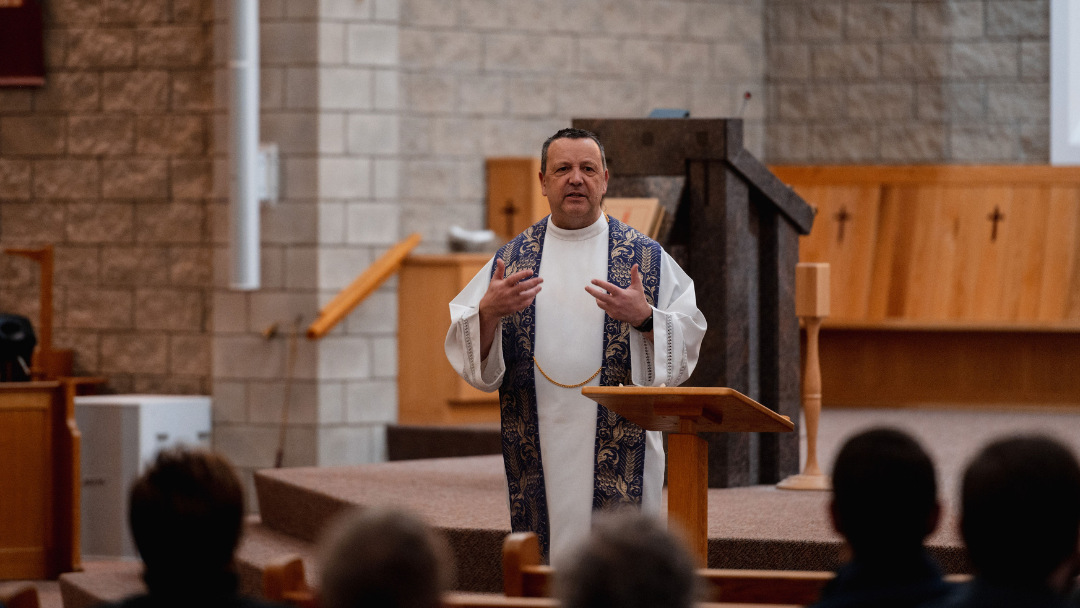
Why did you go to an Ontario seminary?
You know, I felt that it was important for my own maturing process to go away for a while. Being here in Edmonton, everything would have been so simple because of the strong relationships I\’d built up within the church community here. So I felt that I would have been too insulated, staying home. Archbishop Joseph MacNeil agreed with me when I presented my reasons for wanting to go away. I thought that I needed, you know, a little bit of separation.
What did your family think of you entering the seminary?
Everybody was supportive. You know, the reality is that the Church was my second home, even while I was going to university. I spent so much time in churches. If somebody didn\’t catch me at home, they knew that I was probably at the church. So nobody was surprised.
As a matter of fact, a friend of mine that I was working with, at Safeway, he said to me one time “you\’re probably going to be a priest, aren\’t you?” Even for my coworkers, it wasn’t a surprise.
Just before I entered the seminary, my dad and I actually drove all the way down to London, Ontario. It\’s a 40-hour drive. And because we shared the task of driving, we did it all in one, big drive, straight through. We went down to meet with the rector of the seminary in London, to make sure that everything was in order and then we drove all the way back home.
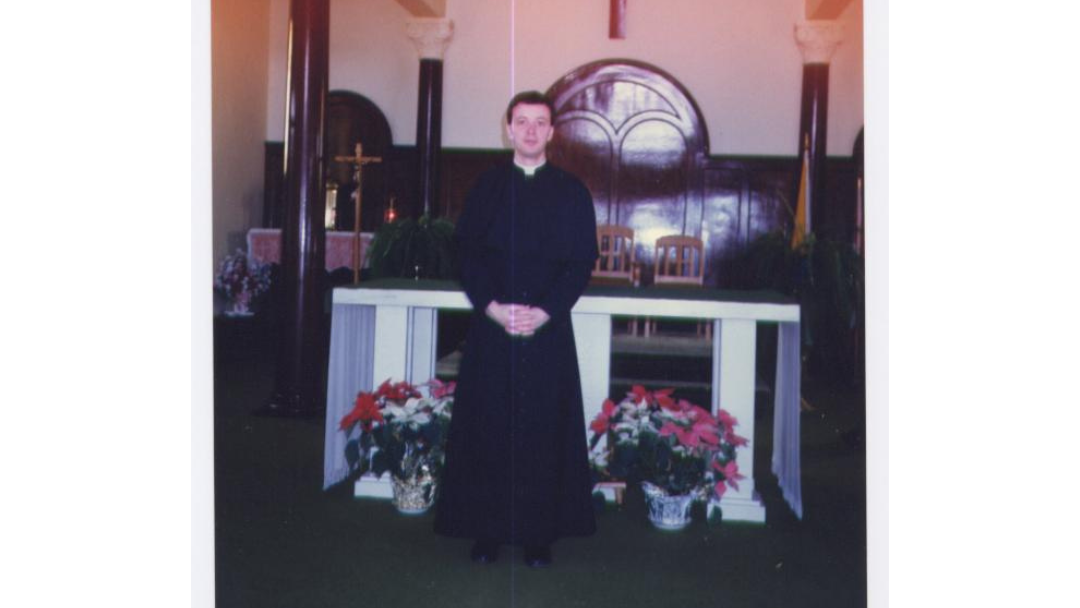
Do you remember ever being fearful of becoming a priest?
I think that the emotion that might better express my experience was caution, caution in terms of realizing that this is God\’s call. I remember sometimes, in the chapel of the seminary, I would tell God: “You know if this isn’t what you want me to do, just let me know, and I’ll be gone this afternoon.”
I realized if this is indeed God\’s call, then this is a demanding call. So it was something not to be taken lightly. But I don\’t remember ever being fearful of the vocation.
Part of it – why I wasn’t fearful – was the friendships I had with some of the older priests of the Archdiocese. They never made the priesthood seem like something that needed to be feared.
When you were discerning the priesthood, what did you think of the fact that you wouldn’t get married or have biological children?
Well, certainly, it wasn\’t something to take lightly. I could recognize that this is a natural desire, to desire marriage. But again, it wasn\’t something that I was fearful of or anything like that. I knew it was a major sacrifice, but it wasn\’t something that caused any fear.
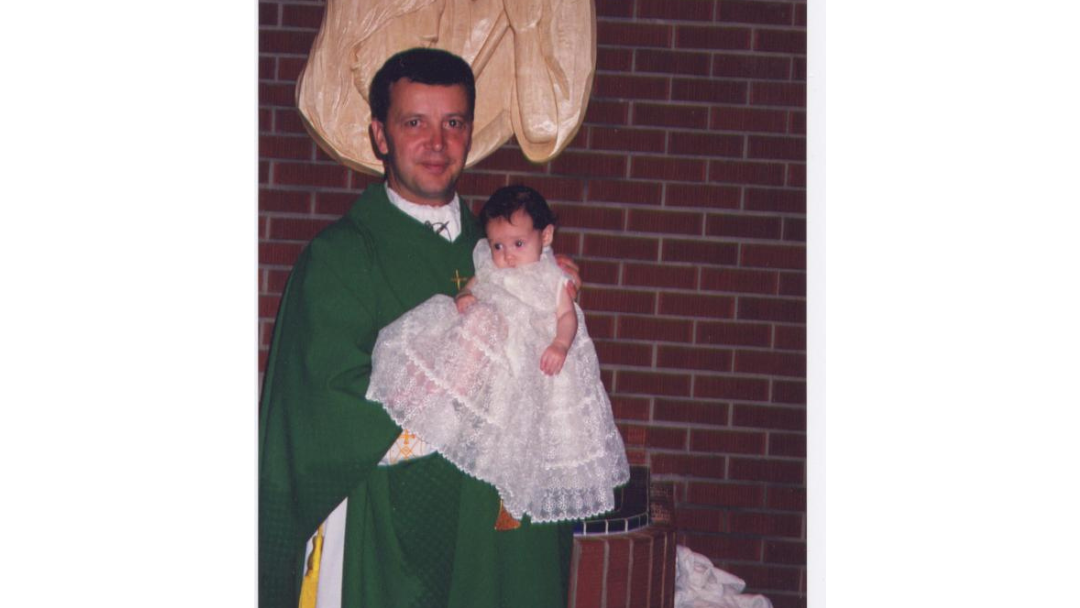
Did you ever doubt your vocation to the priesthood?
There was never a time of really, seriously doubting. I never had any strong sign from God to say yes. But I never had any strong sign from God to say no, either. I was open, either way. If God didn\’t want me to be a priest, I was going to be OK with that. I would have never considered my years in the seminary to be wasted years.
If God had given me a clear sign, I would have liked it, that there would have been something more definitive for me to know \’yes\’ or \’no.\’ At the same time, I also trusted my spiritual director when he said that he believed that this was God\’s call in my life.
It seems that there wasn’t one, big dramatic moment when you knew that you were meant to be a priest?
Yes, and it was a long time. It was over the course of a lot of years, from junior high up until the time I was 22, when I finally entered the seminary. I didn\’t have one, strong thing. It was just small stuff over the course of many years.
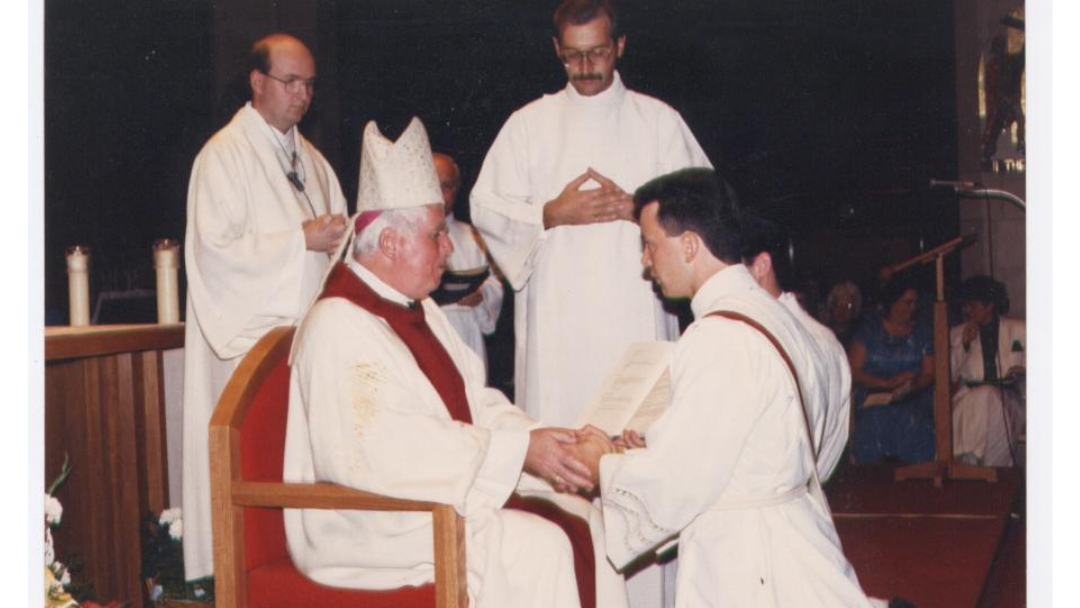
On the day of your ordination to the priesthood, what were you feeling?
Yes, it was kind of funny because people often ask me the question: “When did I know that I was going to be a priest?” I always tell them: “When the Bishop laid his hands on my head, that\’s when I knew.”
You know, I\’ve tried to do this in my own life, and I\’m not sure if I did it completely successfully: I try to be open to God\’s will, even at the last minute, even at the last moment.
Obviously, the closer I got to ordination, I knew that even though I had to be open to God’s will, I knew that it is unlikely that God, an hour before ordination, is going to stop the whole thing. But like I say, I only knew that I would be a priest when the bishop laid his hands on me.
For someone who is discerning their vocation, do you think that it’s natural to take small steps, even without any big signs from God?
Yes, I would definitely say that, because from my perspective, it seems like in the majority of cases where someone receives a call from God, the call is more subtle; it’s not dramatic. Getting a dramatic call may be more common than I think, but for the most part, I think that it\’s more of a gentle movement of the Holy Spirit in the person\’s life. I always encourage people to discern, but not to wait until they have absolute answers to start moving in a direction.
There\’s an old saying that “God can\’t drive a parked car.” We have to start moving. We might discern wrongly, but we have to trust that if we\’ve discerned wrongly that God will give us more clarity.
For example, Cardinal [Thomas] Collins (former Archbishop of Edmonton) used to talk about how, when he went to the seminary, it just felt right, it fit like a glove. But you know, very often it\’s not that clear, or somebody might be wrestling when they go to the seminary. They think that that\’s a sign that God doesn\’t want them there, but God may also want them to persevere through the struggle.
Obviously, all of these things have to be discerned with a spiritual director.
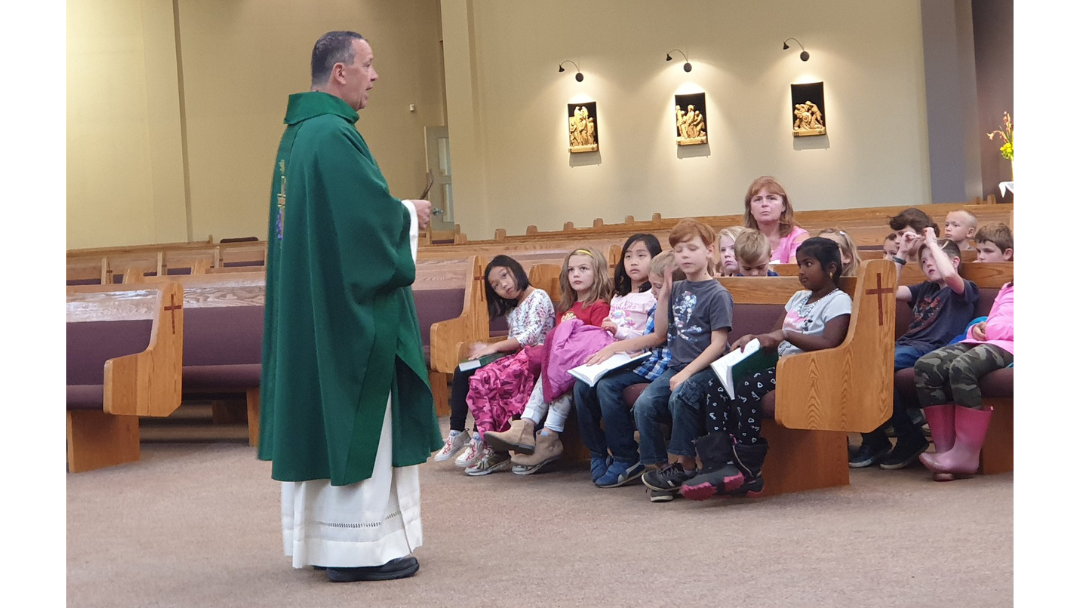
How did you choose between a religious order and diocesan priesthood?
I followed the path that I very often encourage other people to take as well, because there\’s such a need within the parishes of our diocese. I always think that the default setting should be diocesan priesthood. There is such a need, and for somebody who has had their vocation nurtured within a particular community to go out someplace else, when their own local community might be deprived of the sacraments. . . Both are good ways to be a priest, but have diocesan as your default setting.
You know, I thought about being a missionary priest, but then I thought about my home town and I thought “What\’s more missionary territory than this? Where is there a greater need than what is right in front of me?”
So that plays into discernment: where the need is in the Church. Knowing where priests are needed should be factored into your discernment. That\’s what I did.
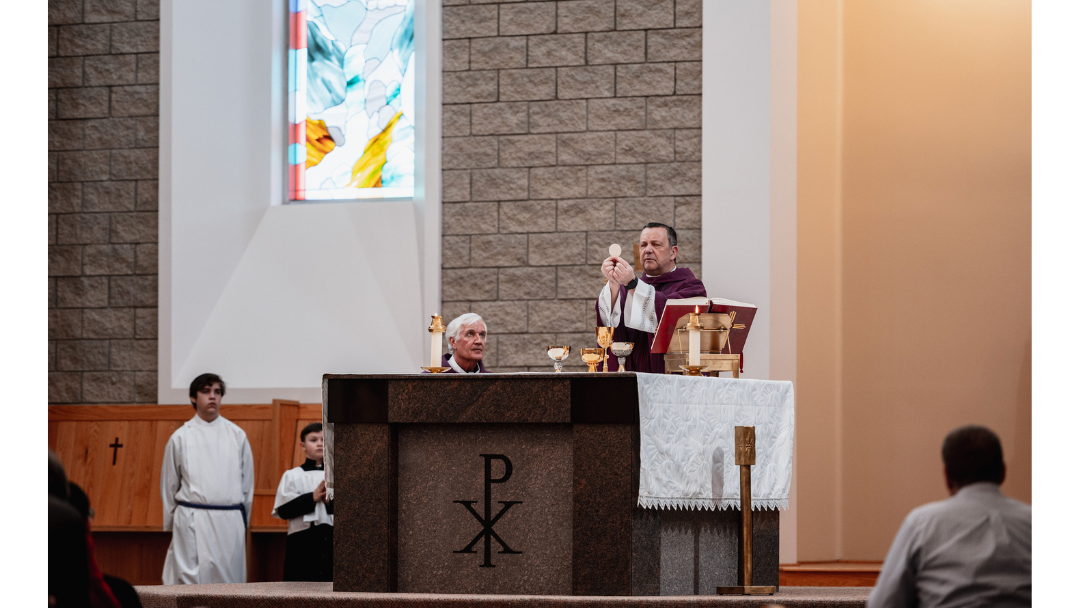
What challenges did you experience in your first, few years as a priest?
Well, for instance, I began to recognize that I\’m weak in terms of things like administration. A lot of diocesan priesthood deals with running a parish and the administrative aspects of doing that. That\’s an area that I have a particular weakness in.
But you know, I also recognize that nobody\’s going to be good at everything. Unless I get a really clear sign from God that He wants me to go somewhere else, then I know that I am where I’m meant to be.
What would you say to a young priest or a seminarian who is concerned about his administrative skills?
My immediate reaction is to not be overly concerned about those weaknesses.
I remember hearing a story about one of our Popes, I don’t remember which one. When he was elected Pope he went before the Lord and he said, “Lord, you know I don\’t have a good memory. And you know that I need a good memory! Please give it to me!”
And so, of course, the Lord helped him in that area. The fact is that the administrative part of things, even though it is important, is not the most important thing. People can learn. I\’ve learned a lot of things. Of course, I still make a lot of mistakes.
It is like Moses, when the Lord called him [in the Bible], to speak, but he had a stutter. But the Lord did not take away his stutter. The Lord still called him to that task, that ministry. It\’s the same with us. We come with our strengths and some of our weaknesses.
When I first came to Holy Trinity parish, I told people, but I don’t think they believed me. I said: “You know, I\’m not an administrator.” The office staff really earn their pay when they work with me! Sometimes it can be hard because our weaknesses can sometimes impose challenges on other people.
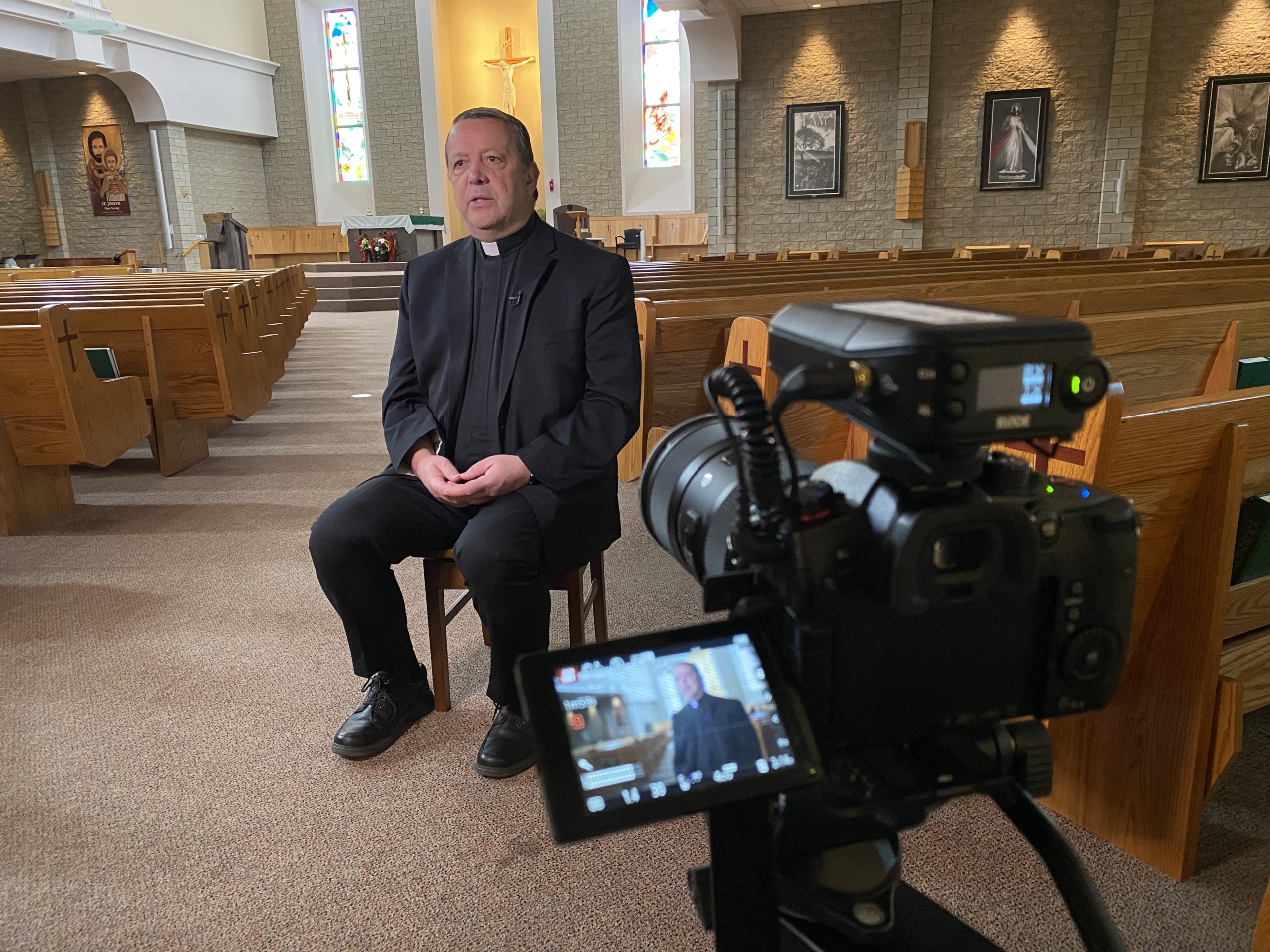
What brings you the most joy in your life?
Well, the highlight is to celebrate the Eucharist on a daily basis, and the teaching aspect that is involved with the priesthood. My strength is in the area of teaching and so I\’ve always enjoyed that particular part of things.
How would you counsel a man who is drawn to the priesthood but he is fearful or hesitant?
I would say, if they have any kind of inkling that God is calling them to the priesthood, even if it\’s not sure, even though it\’s not strong, follow that path!
As you go down that path, God will give you the assurances that you need. Make sure that you build on your relationship with God, because obviously, that\’s where this all comes from. That is what is going to allow you to fulfill the vocation which God has called you to.
You might think that to run away from God is the more secure path. But the reality is that, just like the prophet Jeremiah, when he ran away from God, he said, “My heart is burning. I could not do it. I couldn\’t run away from God!”
That is what I would say: Don\’t run!
Visit the website for St. Joseph Seminary.
(This interview has been edited for clarity and brevity)
Jenny Connelly – Archdiocese of Edmonton
Be Not Afraid is a series of videos and companion articles that tell the stories of 12 religious sisters and priests who serve within the Archdiocese of Edmonton.
New episodes are released every Thursday. Subscribe to our YouTube channel to watch new episodes each week.

